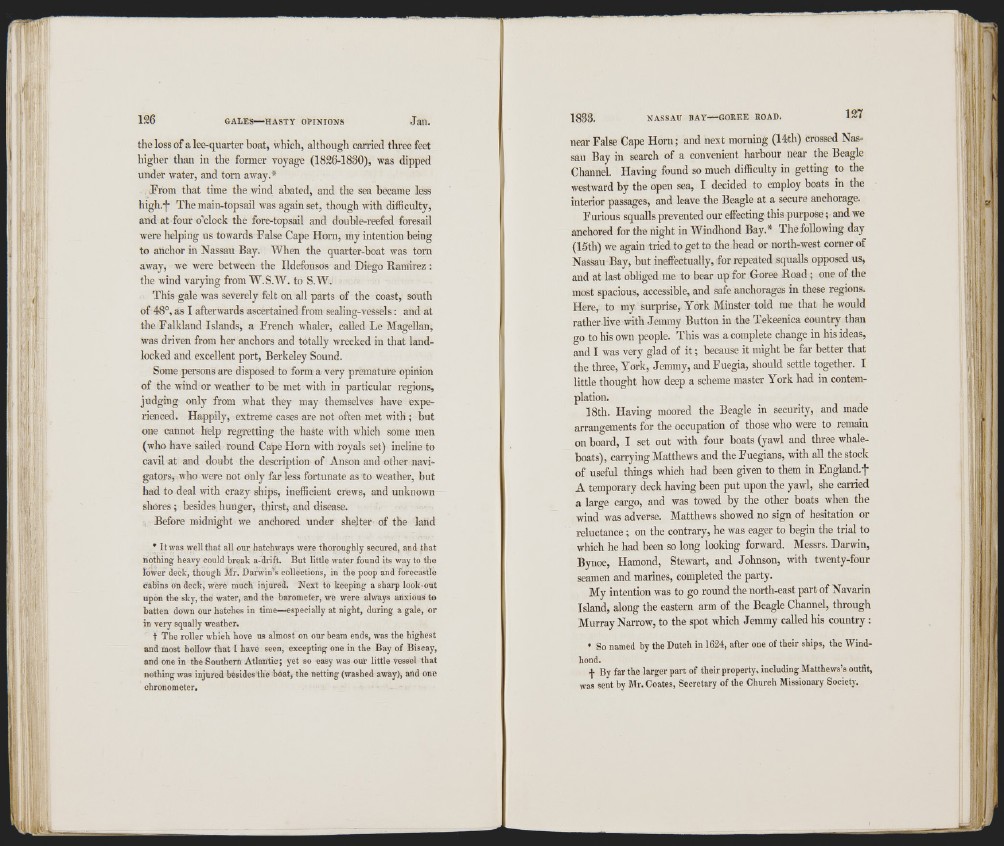
if
H'fi !'f
i ; ' :
ii
i i: |
i f i i
H'U:!'
iir i
126 GALES— HASTY OPINIONS Jan.
the loss of a lee-quarter boat, which, although carried three feet
higher than in the former voyage (1826-1830), was dipped
under water, and torn away.*
From that time the wind abated, and the sea became less
high.-)- The main-topsail was again set, though with difficulty,
and at four o’clock the fore-topsail and double-reefed foresail
were helping us towards False Cape Horn, my intention being
to anchor in Nassau Bay. When the quarter-boat was torn
away, we were between the Ildefonsos and Diego Ramirez :
the wind varying from AA’'.S.A¥. to S.W.
This gale was severely felt on all parts of the coast, south
of 48°, as I afterwards ascertained from sealing-vessels: and at
the Falkland Islands, a French whaler, called Le Magellan,
was driven from her anchors and totally wrecked in that landlocked
and excellent port, Berkeley Sound.
Some persons are disposed to form a very premature opinion
of the wind or weather to be met with in particular regions,
judging only from what they may themselves have experienced.
Happily, extreme cases are not often met with ; but
one cannot help regretting the haste with which some men
(who have sailed round Cape Horn with royals set) incline to
cavil at and doubt the description of Anson and other navigators,
who were not only far less fortunate as to weather, hut
had to deal with crazy ships, inefficient crews, and unknown
shores ; besides hunger, thirst, and disease.
Before midnight we anchored under shelter of the land
• It was well that all our hatchways were thoroughly secured, and that
nothing heavy could hreak a-drift. But little water found its way to the
lower deck, though Mr. Darwin’s collections, in the poop and forecastle
cahins on deck, were much injured. Next to keeping a sharp look-out
upon the sky, the water, and the barometer, we were always anxious to
batten down our hatches in time—especially at night, during a gale, or
in very squally weather,
f The roller which hove us almost on our beam ends, was the highest
and most hollow that I have seen, excepting one in the Bay of Biscay,
and one in the Southern Atlantic; yet so easy was our little vessel that
nothing was injured besides the boat, the netting (washed away), and one
chronometer.
1833. NASSAU BAY GOREE ROAD. 127
near False Cape Horn; and next morning (I4th) crossed Nassau
Bay in search of a convenient harbour near the Beagle
Channel. Having found so much difficulty in getting to the
westward by the open sea, I decided to employ boats in the
interior passages, and leave the Beagle at a secure anchorage.
Furious squalls prevented our effecting this purpose; and we
anchored for the night in Windhond Bay.* The following day
(15th) we again tried to get to the head or north-west corner of
Nassau Bay, hut ineffectually, for repeated squalls opposed us,
and at last obliged me to bear up for Goree Road ; one of the
most spacious, accessible, and safe anchorages in these regions.
Here, to my surprise, York Minster told me that he would
rather live with Jemmy Button in the Tekeenica country than
go to his own people. This was a complete change in his ideas,
and I was very glad of i t ; because it might be far better that
the three, York, Jemmy, and Fuegia, should settle together. I
little thought how deep a scheme master York had in contemplation.
18th. Having moored the Beagle in security, and made
arrangements for the occupation of those who were to remain
on board, I set out with four boats (yawl and three whaleboats),
carrying Matthews and the Fuegians, with all the stock
of useful things which had been given to them in England.f
A temporary deck having been put upon the yawl, she carried
a large cai-go, and was towed by the other boats when the
wind was adverse. Matthews showed no sign of hesitation or
reluctance ; on the contrary, he was eager to begin the trial to
which he had been so long looking forward. Messrs. Darwin,
Bynoe, Hamond, Stewart, and Johnson, with twenty-four
seamen and marines, completed the party.
My intention was to go round the north-east part of Navarin
Island, along the eastern arm of the Beagle Channel, through
Murray Narrow, to the spot which Jemmy called his country ;
• So named by the Dutch in 1624, after one of their ships, the Windhond.
j- By far the larger part of their property, including Matthews’s outfit,
was sent by Mr. Coates, Secretary of the Church Missionary Society.
I r '